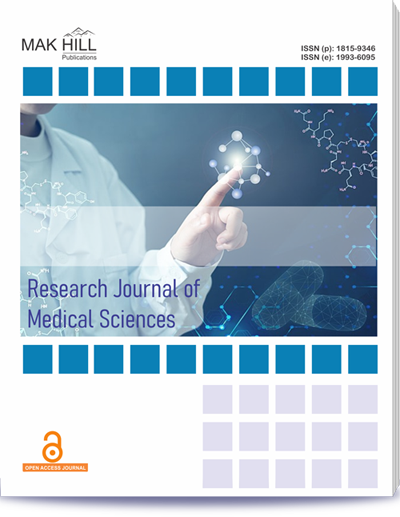
Research Journal of Medical Sciences
ISSN: Online 1993-6095ISSN: Print 1815-9346
146
Views
23
Downloads
Knowledge Attitude and Practice of Pharmacovigilance Among Doctors Posted at Peripheral Health Centers in a District of West Bengal: A Cross‐sectional Study
Soumyadeep Mahapatra, Anindita Maiti, Sabya Sachi Majee and Trisha Banik
Page: 304-310 | Received 31 Jan 2024, Published online: 15 Mar 2024
Full Text Reference XML File PDF File
Abstract
Pharmacovigilance is the science and activities related to the collection, detection, assessment, understanding, monitoring and prevention of adverse drug reactions (ADRs). Adequate monitoring of ADRs is necessary to prevent the rising mortality and morbidity related to an increased number of ADRs. For this purpose, most countries worldwide including India have started their national Pharmacovigilance programs. Involvement of health care professionals (HCPs) of all levels, most importantly the doctors in this program can render its success by regular reporting of ADRs. In India, several ADR Monitoring Centres (AMCs) are set up in different tertiary healthcare centres throughout the country under the Pharmacovigilance Program of India (PvPI) with its National Co‐ordinating Centre at Indian Pharmacopoeia Commission, Ghaziabad, Uttar Pradesh. However the contribution of India towards the Uppsala Monitoring Centre, Sweden (Collaborating centre of WHO for international monitoring of ADRs) is very low. The most important cause of this is the under‐reporting of ADRs by the HCPs, which may be due to their deficit of proper knowledge and practice of regular reporting of ADRs. So our study is to assess the knowledge, attitude and practices (KAP) regarding Pharmacovigilance among the doctors posted at different levels of government rural health centres of a district in the eastern part of India. This was a cross‐sectional study carried out using a pretested self‐administered questionnaire. It was designed to assess the KAP regarding Pharmacovigilance. The study population was the doctors posted at different levels of government rural health centres of a district in the eastern part of India. The questionnaires were distributed to them after proper informed consent and the answers were collected from them after two weeks. The data received from the participants were entered and analyzed by Microsoft Excel spreadsheet in MS Office 10. The response rate of the participants was 90% (126 out of 140). 76.92% didn’t know the correct definition of Pharmacovigilance or awareness about PvPI. 61.54% didn’t know the Website used for reporting ADRs or about the International Collaborating Centre of Pharmacovigilance. But most of the participants agreed or strongly agreed that all health centres should have the Tollfree number for reporting any unwanted drug reaction (61.54%), or have adequate facilities for reporting the same (84.61%). The majority also agreed that ADR reporting should be made mandatory for all doctors of rural health services (92.31%) and all should have the proper knowledge and actively participate in PvPI (76.92%). The majority of the participants have not reported any ADR to any higher authority (84.62%), but are eager to gain proper knowledge regarding PvPI (92.3%) or attend any training or workshop regarding the same (100%). Knowledge regarding PvPI and its practical implications should be present in doctors of all levels. Adequate participation of all doctors can improve the benefits of this program.
How to cite this article:
Soumyadeep Mahapatra, Anindita Maiti, Sabya Sachi Majee and Trisha Banik. Knowledge Attitude and Practice of Pharmacovigilance Among Doctors Posted at Peripheral Health Centers in a District of West Bengal: A Cross‐sectional Study.
DOI: https://doi.org/10.36478/10.59218/makrjms.2024.5.304.310
URL: https://www.makhillpublications.co/view-article/1815-9346/10.59218/makrjms.2024.5.304.310